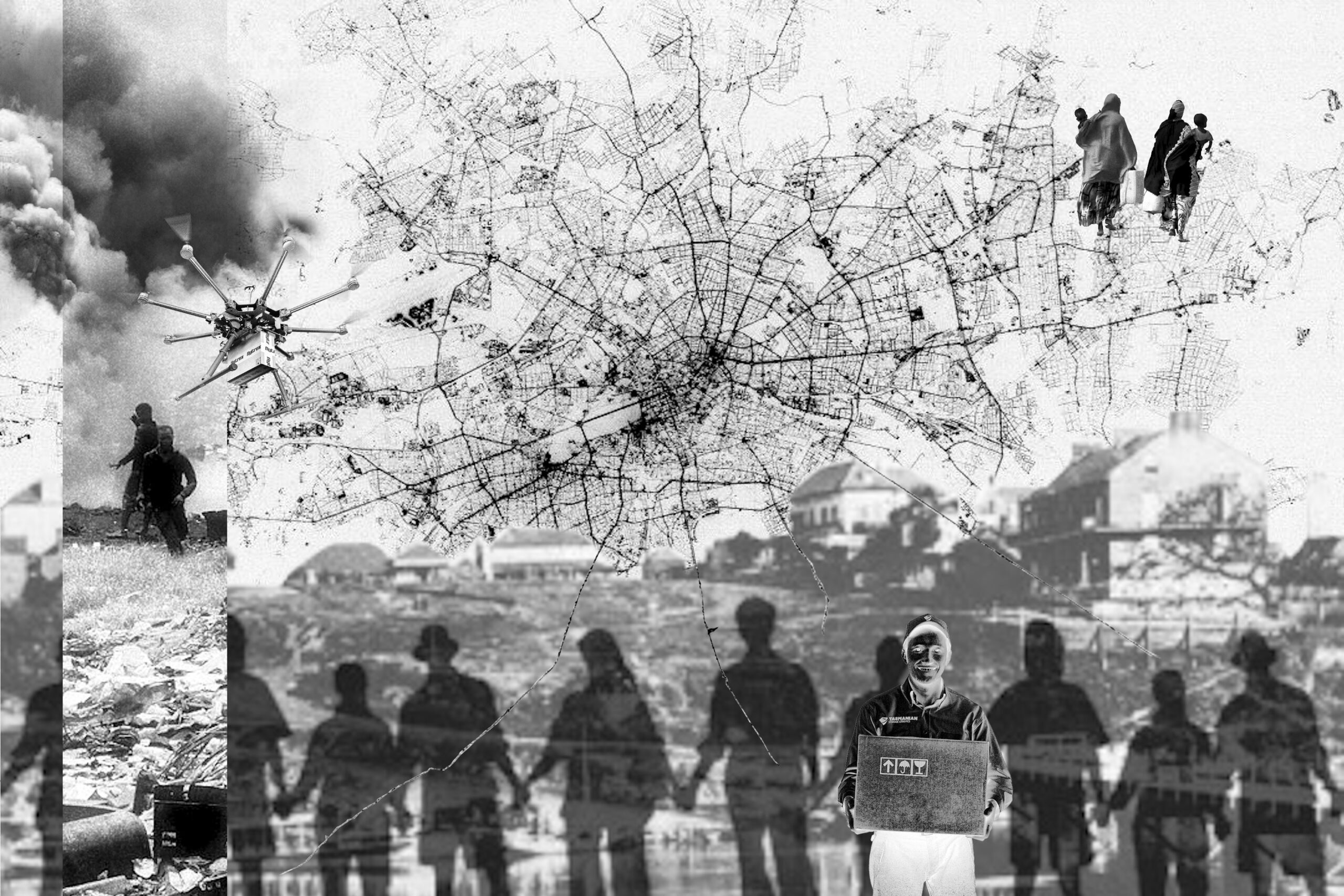
Colonial-capitalist globalization has gradually transformed the earth into a planet of cities: In 1950, less than one-third of the world’s ever-growing population lived in cities; in 2007, for the first time in history, more than half did. According to UN calculations, by 2050 this figure will rise to two-thirds. Given this development, it is not surprising that on such an urbanized planet, global crises as climate collapse are mostly caused by big cities, or more precisely, by urban metabolisms: socio-economic processes, especially growth- and profit-oriented production and consumption, which suck up resources and energy, require an incessant supply of materials, goods, and labor, generate waste, pollution, and more. In other words, the ecological footprints of cities are destabilizing the planet because, as ‘engines of growth,’ cities have become engines of an ecological-economic vicious circle. Here, economic and ecological crises are increasingly devastatingly intertwined and mutually reinforcing, causing, for example, pandemics, biodiversity loss, sanitation crises, resource wars, and the slow violence of climate catastrophe. Meanwhile, the growing instability of the planet reveals that cities are particularly vulnerable to the consequences of the very crises they generate: Ravaged and consequently revolting, ecosystems play back the stress to which they have been subjected (Oxana Timofeeva, 2022); exposed to the feedback of the stress they generate, cities, as infrastructures of capital and life, are increasingly breaking down. How, then, can we politicize the dual role of cities as both drivers and ‘victims’ of the ecological-economic vicious circle?
The ecological-economic vicious circle is driving both ecological collapse and economic violence (austerity, debt, etc.) – both on a global scale, with unevenly distributed local and regional consequences. This apocalyptic scenario not only calls into action emancipatory movements that respond to emergencies with community-based survival strategies. It is also appropriated by alarmists who fuel social polarization, desolidarization, and right-wing mobilization; and who make the recalibration of capitalist warfare and the implementation of green capitalism appear as ‘solutions’ without alternatives. These authoritarian and capital-conformist responses to the polycrisis exacerbate existing imbalances that are particularly pronounced in metropolitan areas, such as social inequality and environmental injustice. Thus, politicizing cities as infrastructures of capital and life, should not least mean addressing them as antagonistic spaces that both underlie and produce conflicts between capitalist actors and those who seek to challenge or survive capitalist devastation. Based on this understanding, the “Kin City” project seeks to explore socio-ecological perspectives on equity and justice, and new possibilities and imaginaries for cross-border (i.e. multi-racial, transnational, non-identitarian) alliances among the expropriated and exploited within the metabolisms of cities.
The focus on existential struggles within urban metabolisms is not least intended to politicize cities in relation to their regional and global contexts: If urban metabolisms produce social, ecological, economic, and spatial inequalities and injustices within cities and at the same time provoke struggles against them, our challenge is to put into political perspective how these conflicts reflect the entanglements of cities with the world. The emancipatory orientation of this approach is reflected in the term “kin” in the project title “Kin City,” defined here as a kinship based on a deep sense of the connections and relationships that hold our world together (Deborah Bird Rose, 2011) and that potentially enable interwoven forms of social, spatial, economic, and ecological justice.
Call for Papers
The series of texts that will be published within the framework of the “Kin City” project – the 25th anniversary project of the BG and a follow up to “Allied Grounds” (2023) – are intended to give voice to seminal narratives, that, in their polyphony, transcend the divisions upon which colonial-capitalist globalization has been thriving and expand our understanding that we are all interdependent.
The Call for Papers is aimed at researchers, activists and cultural workers, who, in theory or practice, are engaged in emancipatory struggles, and seeks to forge links between them by interweaving urban and ecological issues within an expanded internationalist framework, taking into account class, decolonial and migration issues. The “Kin City” project will focus on the following five thematic strands and the BG calls for submissions related to at least one of these areas:
1) Privatization vs. commoning of access to essential urban resources (from housing to water): Why has reclaiming the infrastructure of life from capital become even more urgent in the wake of the climate crisis?
2) Environmental and climate (in-)justice in cities: What does it mean to be up against urban environmental racism?
3) Updating working-class environmentalism in the city as factory: What are the challenges of multisectoral labor struggles in the “green” transition of cities?
4) What does it mean to decolonize urban metabolisms? Cities as centers of (“green”) resource and energy coloniality
5) Escaping from or to the metropolis? The climate crisis as cause/driver of displacement and flight and the role of cities in this context
Texts of 1,500 words or 10,000 characters will be published in the BG under a Creative Commons license in English and German throughout the year. They can be submitted in either language to info (at) berlinergazette (dot) de until July 1, 2024 or November 15, 2024. Deadlines can also be arranged individually.
In an introductory essay, Magdalena Taube and Krystian Woznicki, the curators and organizers of the project, outline the various themes and how the project proposes to bring them together. The essay, which is still a work in progress, is an 9,000-word piece that will be published later this year as a multilingual booklet (print and open-access PDF). You can now access the draft, last updated on January 29, in a secure cryptpad, best viewed with Chrome and Firefox browsers:
https://cryptpad.berlinergazette.de/pad/#/2/pad/edit/cPWajKHNHz8-2Lg5+dBCcN5r/
I am interested in presenting. My work is in clinical trauma response and my research on Balkan Route socio-cultural-environmental impact. Is there a site for papers?
@Dr. Danica Anderson: Thank you for your message! Please submit your proposal/paper under info (at) berlinergazette (dot) de and please indicate which of the five thematic strands (see above) your proposal/paper relates to.